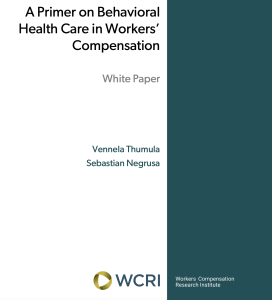is one of the most important papers WCRI has published in recent memory.
Authors Vennela Thumula PharmD and Sebastian Negrusa PhD have produced a comprehensive analysis of the subject, one every work comp manager, claims exec, regulator clinician and risk manager should have within easy reach.

Among the topics addressed are:
- How do you define behavioral health in the context of workers’ compensation?
- What are psychosocial factors and can they be a barrier to recovery following a work-related injury?
- How important is early screening for psychosocial factors and other mental health conditions?
- What non-medical and medical interventions exist to help those with behavioral health problems?
I’m working my way through the study; it has reinforced my belief that mental health/behavioral health issues/concerns are likely the primary barrier to recovery.
Chief among these are psychosocial factors that may impede recovery;
-
-
- poor recovery expectations
- fear of pain\catastrophizing
- perceived injustice
- pessimism
- general fearfulness
- job dissatisfaction
- lack of family/social support systems
-
Friend and colleague Bill Zachry has long noted that Adverse Childhood Events can be a key obstacle to recovery – in fact research indicates victims of abuse are more likely to be disabled during adulthood.
The paper also provides state-by-state details on coverage of mental stress and psychotherapy issues and the status of BH specialists as treating medical providers.
I’d be remiss if I didn’t note Carisk’s David Vittoria has been a persistent voice advocating for increased focus on BH issues. (Carisk is an HSA consulting client)
The study is free for WCRI members; there’s a nominal cost for non-members. Get yours here.
What does this mean for you?
Read this paper.



fromChris Brigham MD
Joe, thanks for sharing this information. To achieve positive outcomes, we must approach injuries with a “biopsychosocial” perspective, understanding the relationships of body, mind, and spirit. Often behavioral issues are more predictive of recovery than the severity of the physical injury. Unfortunately, litigation often perpetuates challenges that an injured worker may face. Understanding and managing behavioral issues, personality structure, and psychological issues are beneficial in encouraging resiliency and maintaining a positive focus. Joe, you assist all of us in bringing this to our awareness. Thank you.